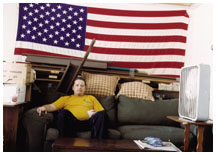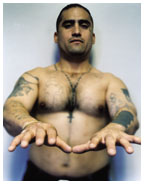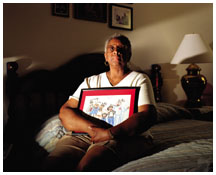
|
|
October 19, 2005: Features
Unacceptable
losses
Portraits of loss and strength
(Photographs © Arthur Robinson Williams ’04)
Robin Williams ’04 has spent the last year photographing and interviewing Americans affected by drugs and drug policy. His work, compiled in an exhibition and Web site (UnacceptableLosses.org), calls for treating addiction as an illness, not as criminal activity. “The causes of drug addiction are complex,” says Williams. “These stories and portraits are meant to help us envision a nation where those suffering from addiction are embraced, not incarcerated.” Williams, whose work was sponsored by the Class of 1956’s Reach Out ’56 Foundation, is pursuing a medical degree and a master’s degree in public health at the University of Pennsylvania. His photographs will be displayed at the Bernstein Gallery in Robertson Hall in the 2006–07 academic year.

“When I got back from Vietnam, I spent six months in the hospital. They pumped me full of morphine. It was the first time I had ever used drugs ... I’ve been on methadone for 33 years.”
Freddy, 54, Boston
A Vietnam veteran, Freddy was wounded in action and struggled with heroin addiction after returning to the United States. Now he volunteers with the National AIDS Brigade, a needle-exchange program.

“I think every drug addict comes to a point in their life where they put out their hand and say they want to quit. But sometimes there’s not another hand to hold. They reach out for nothing. If there’s nothing there for them to grab onto, they’re going to grab right back onto the drug. And you can’t blame them. What else do they have?”
Paula, 56, Española, N.M.
Paula became addicted in her mid-20s while living with an abusive husband.

“A lot of people think it’s easy, you know: Back out of the penitentiary and get a job. They say a lot of people will hire ex-offenders. I couldn’t tell that! They ask a few questions. I wear long sleeves to go to job interviews – you know, to look real nice – and they see this tattoo on my face. I want to take that off so bad.”
Ramon, 35, Dallas
Ramon, who has used drugs since he was 15 and spent five years in prison, is now receiving rehabilitation services at a Dallas treatment center.

“Three hundred and sixty months. ‘I knew my fate had been decided the day I walked in this courtroom’ — that’s what Jeff said to the judge when asked if he would like to say anything. ... To be honest, he was not innocent. But even though he was doing what he was doing, the punishment did not fit the crime. He was given a 30-year sentence.”
Elaine, 63, Charlotte, N.C.
Elaine is the mother of a son, Jeff, who has been imprisoned for more
than 10 years for a nonviolent drug offense, his first. She has become
an activist fighting against mandatory minimum sentences. ![]()
